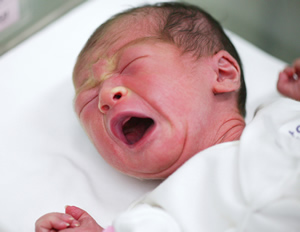Neonatal Therapeutic Unit
 Pregnancy & Substance Use
Pregnancy & Substance Use
The CDC has identified prescription painkiller misuse as a major health threat, and the number of pregnant women who misuse painkillers is growing exponentially. Mothers who are dependent on drugs give birth to babies who are prenatally exposed to drugs. Currently, about two prenatally exposed babies are born every hour.
These newborns experience neonatal abstinence syndrome (NAS), which is a group of problems that occur in newborns exposed to substances, such as amphetamines, barbiturates, benzodiazepines, cocaine and/or opiates/narcotics (heroin, methadone, codeine) while in the mother’s womb. These substances pass through the placenta to the baby during pregnancy, and the baby becomes addicted to them, along with the mother.
A Special Unit
Not all babies born prenatally exposed need care in the highly sophisticated NICU, so they are usually admitted to our Neonatal Therapeutic Unit (NTU). This unit is the first of its kind in the state of West Virginia and one of the first in the United States. In this unit, the babies benefit most from the quiet, supportive hospital setting the NTU offers, with an experienced staff to provide the level of care these babies need. Because highly specialized, acute and complex care is not necessary, the cost of caring for them in the NTU is significantly lower.
The Baby's Symptoms
The symptoms of withdrawal depend on the amount and type of substances the mother used, how long she used them and whether the baby was born full-term or early/premature. Symptoms may begin within a few days after birth, or they may take 5 - 10 days to appear. They may include:
- Blotchy skin coloring (mottling)
- Diarrhea
- Excessive or high-pitched crying
- Excessive sucking
- Fever
- Hyperactive reflexes
- Decreased muscle tone
- Irritability
- Poor feeding
- Rapid breathing
- Seizures
- Sleep problems
- Slow weight gain
- Stuffy nose, sneezing
- Sweating
- Trembling/tremors
- Vomiting
Treatment
The healthcare team observes the newborn carefully for signs of withdrawal, feeding problems, and weight gain. Babies who vomit or who are very dehydrated may need to get fluids through a vein. An infant with neonatal abstinence syndrome is often fussy and hard to calm. The staff maintains a quiet, calm environment with reduced noise and dim lights, which allows for the gentle rocking for the baby, swaddled in a blanket.
Babies with severe symptoms may need medicine, such as morphine or methadone. The doctor may prescribe the infant a substance similar to the one the mother used during pregnancy and slowly decrease the dose over time, which helps wean the baby off the substance and relieve some withdrawal symptoms. Breastfeeding may also be helpful.
Because babies with this condition often have poor feeding or slow growth, they may need a higher-calorie formula that provides greater nutrition and/or smaller portions given more often.
What's Next
To provide the babies with the best possible care and opportunity for recovery, NTU staff and physicians involve the mother, father, and extended family in forming healthy habits that will continue beyond the hospital stay.
The hospital is committed to providing these infants with the most current and effective care. The staff continues to explore best practices with hospitals across the country and investigate new treatment options, care models, clinical trials and studies to better understand the possible impact of prenatal substance use. Adjustments to the facility, staffing, and care may be made as we learn more.
Source: www.NIH.gov
